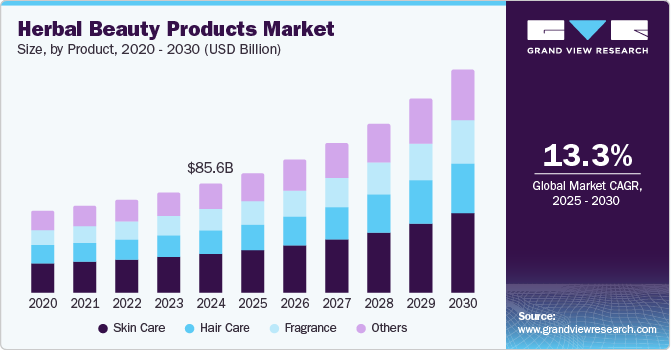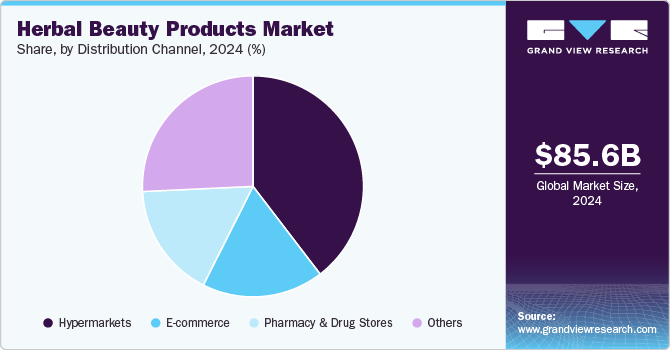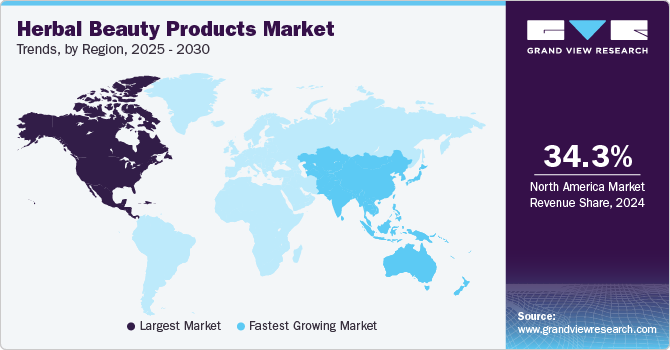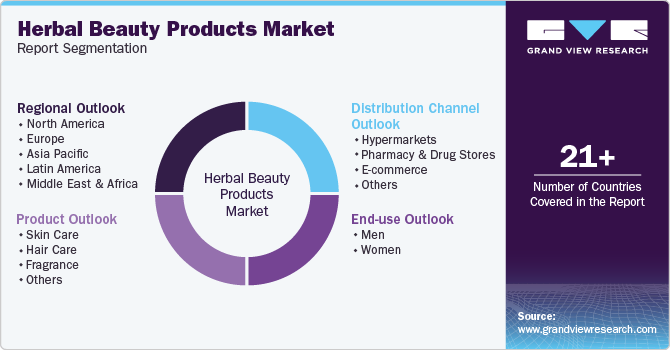- Home
- »
- Beauty & Personal Care
- »
-
Herbal Beauty Products Market Size, Industry Report, 2030GVR Report cover
![Herbal Beauty Products Market Size, Share & Trends Report]()
Herbal Beauty Products Market Size, Share & Trends Analysis Report By Product (Skin Care, Hair Care, Fragrance), By End-use (Men, Women), By Distribution Channel, By Region, And Segment Forecasts, 2025 - 2030
- Report ID: GVR-4-68038-736-0
- Number of Report Pages: 80
- Format: PDF, Horizon Databook
- Historical Range: 2018 - 2023
- Forecast Period: 2025 - 2030
- Industry: Consumer Goods
Herbal Beauty Products Market Trends
The global herbal beauty products market size was valued at USD 85.55 billion in 2024 and is expected to grow at a CAGR of 13.3% from 2025 to 2030. The market growth is attributed to the growing consumer awareness of the harmful effects of synthetic chemicals found in conventional beauty products, leading to a shift towards natural and organic alternatives. Herbal beauty products, derived from natural sources such as plants and herbs, are perceived as safer and gentler on the skin. Additionally, the rising demand for clean beauty products, emphasizing transparency in labeling and avoiding harmful ingredients, is propelling market growth.

The influence of social media and beauty influencers, who often promote natural and herbal skincare regimens, is also driving consumer interest and sales. Furthermore, the increasing disposable incomes and health-consciousness among consumers are encouraging the adoption of premium, eco-friendly beauty products. In addition, the increasing disposable incomes and health-consciousness among consumers are encouraging the adoption of premium, eco-friendly beauty products. The burgeoning popularity of holistic and wellness lifestyles is also contributing to the demand for herbal beauty products, as consumers seek products that align with their overall health goals. Innovations in product formulations, incorporating advanced herbal extracts and sustainable practices, are attracting environmentally conscious consumers.
Growing preference for herbal ingredients that act as a natural remedy for acne skin and hair-related problems has been enhancing market growth. Established market players have been focusing on acquiring firms dealing in natural beauty and personal care segments to widen the customer base by attracting people who are increasingly passionate about healthy, herbal, and natural products. In November 2024, Nykaa, the prominent Indian beauty and fashion retailer, acquired the clean skincare brand Earth Rhythm. While financial details remain undisclosed, this move aligns with Nykaa's strategy to enhance its portfolio in the clean beauty sector.
In October 2024, Mario Limited acquired Just Herbs, securing the remaining 40% equity in Apcos Naturals Private Limited, the parent company of the Just Herbs brand. This strategic acquisition is expected to significantly enhance Just Herbs’ expansion efforts.
Product Insights
Skincare dominated the market with the largest revenue share, 36.2%, in 2024. The increasing awareness of the benefits of natural and organic ingredients in skincare products is significantly boosting consumer demand. Consumers are seeking effective, safe, and gentle solutions for their skin concerns, and herbal skincare products, with their natural extracts and minimal chemical content, meet these requirements. The rising prevalence of skin issues, such as acne, aging, and sensitivity, is also driving the demand for herbal skincare products, which are perceived to be less irritating and more beneficial for long-term skin health. Additionally, the influence of social media and beauty influencers, who often highlight the effectiveness of natural skincare routines, is further propelling market growth.
The fragrance segment is expected to grow at the fastest CAGR of 13.7% over the forecast period owing to the increasing consumer preference for natural and organic fragrances, as people become more aware of the potential health risks associated with synthetic chemicals used in conventional perfumes. Herbal fragrances, derived from essential oils and plant extracts, are perceived as safer and more environmentally friendly. Additionally, the rise of wellness and self-care trends is encouraging consumers to opt for natural scents that offer therapeutic benefits, such as relaxation and stress relief. The influence of social media and beauty influencers, who often promote the benefits of natural and herbal fragrances, is also driving market growth.
Herbal hair care products, particularly shampoos and conditioners, have been witnessing significant growth, which is expected to drive the overall growth of the market. These products are made with natural, pure plant extracts, which help accelerate healthy hair growth. In addition, these products significantly reduce hair loss, clean the scalp naturally, and are suitable for all hair types.
End-use Insights
Women dominated the market with the largest revenue share in 2024. Women increasingly prioritize natural and organic beauty products as they become more aware of the potential side effects of synthetic ingredients in conventional products. The rising trend of clean beauty, which emphasizes transparency, sustainability, and natural formulations, is particularly popular among female consumers. Social media and beauty influencers significantly promote herbal beauty products, driving consumer interest and adoption. Additionally, the availability of a wide range of herbal beauty products tailored to women's skincare, haircare, and personal care needs ensures that there is something for everyone. The focus on self-care and wellness among women and increasing disposable incomes further boost spending on premium and natural beauty products.
The men segment is expected to grow at the fastest CAGR over the forecast period owing to the increasing awareness among men about the benefits of natural and organic skincare, leading to a rising demand for herbal beauty products. The influence of social media and grooming influencers is significantly shaping consumer preferences, encouraging men to invest in natural and effective skincare solutions. Additionally, the trend towards self-care and wellness among men is propelling the market forward, with a growing number of men seeking products that cater to their specific skincare and grooming needs. The availability of a diverse range of herbal products, from facial cleansers and moisturizers to hair care and beard care products, is making these offerings more accessible to male consumers.
Distribution Channel Insights
Hypermarkets dominated the market with the largest revenue share in 2024. Hypermarkets offer various products under one roof, making them a convenient shopping destination for consumers seeking herbal beauty products. The ability to physically inspect products, coupled with the availability of expert advice and product demonstrations, enhances the shopping experience and builds consumer trust. Additionally, hypermarkets often feature promotional events, discounts, and loyalty programs that attract a large customer base. The strategic locations of hypermarkets in urban and suburban areas ensure easy accessibility for a broad range of consumers.

E-commerce is expected to grow at the fastest CAGR over the forecast period. The increasing popularity of online shopping platforms and their convenience are making it easier for consumers to purchase herbal beauty products from the comfort of their homes. E-commerce platforms provide vast options, detailed product descriptions, customer reviews, and ratings, helping consumers make informed decisions. Additionally, the influence of digital marketing and social media advertising is effectively reaching a broader audience and boosting online sales. Exclusive online discounts, promotions, and subscription services further incentivize consumers to shop for herbal beauty products online.
Regional Insights
North America herbal beauty products market dominated the global market with the largest revenue share of 34.3% in 2024. The increasing consumer awareness of the benefits of natural and organic ingredients in beauty products is significantly boosting demand. North American consumers, particularly in the U.S. and Canada, prioritize clean beauty products emphasizing transparency and sustainability. The influence of social media and beauty influencers is also playing a crucial role in promoting herbal beauty products, driving consumer interest and adoption. Additionally, the region's well-developed retail infrastructure, both online and offline, ensures wide accessibility to a variety of herbal beauty products. The strong presence of major beauty brands and the continuous introduction of innovative herbal formulations further contribute to the region's market leadership.

U.S. Herbal Beauty Products Market Trends
The U.S. herbal beauty products market is expected to grow significantly over the forecast period. The rising trend of clean beauty, emphasizing transparency, sustainability, and safe formulations, is further propelling market growth. Additionally, the influence of social media and beauty influencers, who advocate for natural and herbal skincare routines, is driving consumer interest and adoption. The growing demand for eco-friendly and cruelty-free products is also contributing to the expansion of the herbal beauty market. Moreover, the U.S. market's well-developed retail infrastructure, both online and offline, ensures wide accessibility to a variety of herbal beauty products.
Europe Herbal Beauty Products Market Trends
Europe herbal beauty products industry held a significant share in 2024. The region's deep-rooted tradition of using natural ingredients in skincare and personal care products is a major driver. Consumers in Europe are increasingly seeking products that align with the growing trend of clean beauty, which emphasizes natural formulations, transparency in ingredient sourcing, and eco-friendly practices. The influence of European beauty standards, often highlighting natural and healthy skin, is driving the adoption of herbal beauty products. Additionally, the rising awareness of the benefits of herbal ingredients, such as their antioxidant and anti-inflammatory properties, is propelling market demand. The presence of numerous prestigious skincare brands that emphasize natural and organic products further supports the herbal beauty products industry growth.
Asia Pacific Herbal Beauty Products Market Trends
Asia Pacific herbal beauty products market is expected to grow at the fastest CAGR of 14.4% over the forecast period. The region's rich cultural heritage of using herbal and traditional remedies for beauty and wellness is a significant driver. Countries such as China, Japan, and South Korea, known for their innovative beauty industries, are leading the way in incorporating advanced herbal formulations into skincare products. The growing awareness of natural ingredients' benefits, rising disposable incomes, and improving living standards encourage consumers to invest in premium herbal beauty products. The influence of K-beauty and J-beauty trends, which often emphasize natural and gentle ingredients, is also contributing to the market's expansion. Additionally, the increasing prevalence of e-commerce platforms in the region is making herbal beauty products more accessible to a broader audience. The commitment of local and international brands to sustainable and eco-friendly practices further enhances the market's appeal, driving the dynamic growth of herbal beauty products in the Asia Pacific.
Key Herbal Beauty Products Company Insights
Some key companies in the herbal beauty products market includeVasa Global Cosmetics, Bio Veda Action Research Co., Weleda, ARBONNE INTERNATIONAL, LLC., and others.
-
Weleda is a renowned Swiss company that has been dedicated to natural beauty and holistic wellness for over 100 years. The company produces a wide range of products made from high-quality plant oils, natural extracts, and essential oils. Weleda's products are known for their commitment to sustainability and ethical sourcing of raw materials. It offers a variety of skincare, body care, hair care, and wellness products, all designed to nourish and care for the skin naturally. Some of its popular products include the Skin Food Ultra-Rich Cream, Prickly Pear Cactus Hydrating Facial Mist, and Arnica Massage Oil.
-
Bio Veda Action Research Co. is an Indian company that specializes in Ayurvedic beauty and wellness products. The company combines ancient ayurvedic wisdom with modern biotechnology to create products that promote natural healing and rejuvenation. Its product range includes natural soaps, face oils, facemasks, herbal oils for self-massage (Abhyanga), and essential oils.
Key Herbal Beauty Products Companies:
The following are the leading companies in the herbal beauty products market. These companies collectively hold the largest market share and dictate industry trends.
- Weleda
- Bio Veda Action Research Co.
- ARBONNE INTERNATIONAL, LLC
- Vasa Global Cosmetics
- Klienz Herbal
- Himalaya Wellness Company
- Shahnaz
- Lotus Herbals
- MAV Beauty Brand
- Hemas Holdings PLC.
Recent Developments
-
In September 2024, Indus Valley Organic launched its first ready-to-apply herbal hair care pastes, incorporating traditional ingredients such as amla, bhringraj, shikakai, and brahmi, alongside over 24 whole herbs.
-
In June 2024, My Green Space launched a new range of herbal cosmetics, entering the B2C market with a focus on sustainability and health. The 100% natural products are cruelty-free, paraben-free, sulfate-free, and chemical-free, catering to women’s skin, hair, and face care needs. .
Herbal Beauty Products Market Report Scope
Report Attribute
Details
Market size value in 2025
USD 94.11 billion
Revenue forecast in 2030
USD 175.61 billion
Growth Rate
CAGR of 13.3% from 2025 to 2030
Base year for estimation
2024
Historical data
2018 - 2023
Forecast period
2025 - 2030
Quantitative units
Revenue in USD million and CAGR from 2025 to 2030
Report coverage
Revenue forecast, company ranking, competitive landscape, growth factors, and trends
Segments covered
Product, end-use, distribution channel, region
Regional scope
North America, Europe, Asia Pacific, Latin America, MEA
Country scope
U.S., Canada, Mexico, Germany, UK, France, Italy, Spain China, Japan, India, Australia South Korea, Brazil, Argentina, South Africa
Key companies profiled
Weleda; Bio Veda Action Research Co.; ARBONNE INTERNATIONAL, LLC; Vasa Global Cosmetics; Klienz Herbal; Himalaya Wellness Company; Shahnaz; Lotus Herbals; MAV Beauty Brand; Hemas Holdings PLC.
Customization scope
Free report customization (equivalent up to 8 analysts working days) with purchase. Addition or alteration to country, regional & segment scope.
Pricing and purchase options
Avail customized purchase options to meet your exact research needs. Explore purchase options
Global Herbal Beauty Products Market Report Segmentation
This report forecasts revenue growth at global, regional, and country levels and provides an analysis of the latest industry trends in each of the sub-segments from 2018 to 2030. For this study, Grand View Research has segmented the global herbal beauty products market report based on product, end-use, distribution channel, and region:

-
Product Outlook (Revenue, USD Million, 2018 - 2030)
-
Skin Care
-
Hair Care
-
Fragrance
-
Others
-
-
End-use Outlook (Revenue, USD Million, 2018 - 2030)
-
Men
-
Women
-
-
Distribution Channel Outlook (Revenue, USD Million, 2018 - 2030)
-
Hypermarkets
-
Pharmacy & Drug stores
-
E-commerce
-
Others
-
-
Regional Outlook (Revenue, USD Million, 2018 - 2030)
-
North America
-
U.S.
-
Canada
-
Mexico
-
-
Europe
-
Germany
-
UK
-
France
-
Italy
-
Spain
-
-
Asia Pacific
-
China
-
Japan
-
India
-
Australia
-
South Korea
-
-
Latin America
-
Brazil
-
Argentina
-
-
Middle East and Africa (MEA)
-
South Africa
-
-
Share this report with your colleague or friend.
![gvr icn]()
NEED A CUSTOM REPORT?
We can customize every report - free of charge - including purchasing stand-alone sections or country-level reports, as well as offer affordable discounts for start-ups & universities. Contact us now
![Certified Icon]()
We are GDPR and CCPA compliant! Your transaction & personal information is safe and secure. For more details, please read our privacy policy.
We are committed towards customer satisfaction, and quality service.
"The quality of research they have done for us has been excellent."





